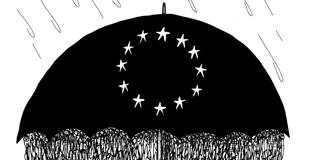 Margaret Scott
Margaret Scott
经济危机和区域一体化哈罗德·詹姆斯
但是,在1930年代,热闹一时的并非仅仅是经济民族主义。还有许多人开始考虑把区域一体化作为应付经济萧条的方案。
但那种在经济危机时的整合往往是毁灭性的。最不具吸引力的版本是1930年代起源于德国和日本的区域主义,那实际上就等于是凌驾于其弱势邻国权威的延伸,在德国的“贸易大区中的自给自足”或其相当于日本的“大东亚共荣圈”的基础上,这些邻国被逼在贸易和财政上依赖德国和日本。由于20世纪30年代的恐怖情况所造成的后果,人们对诸如“大东亚 ” 的概念仍怀有极大的疑虑。
二十世纪的下半叶,欧洲有了建立了一种以更仁慈形式出现的区域主义的机会。但今天,欧洲联盟正在受阻,因为它没有趁市道更好和局势更缓和的时机建立一些更有力的机构。
https://prosyn.org/lS8bLQlzh
To continue reading, register now. It’s free!
Register Now
Already have an account?
Log in
但是,在1930年代,热闹一时的并非仅仅是经济民族主义。还有许多人开始考虑把区域一体化作为应付经济萧条的方案。
但那种在经济危机时的整合往往是毁灭性的。最不具吸引力的版本是1930年代起源于德国和日本的区域主义,那实际上就等于是凌驾于其弱势邻国权威的延伸,在德国的“贸易大区中的自给自足”或其相当于日本的“大东亚共荣圈”的基础上,这些邻国被逼在贸易和财政上依赖德国和日本。由于20世纪30年代的恐怖情况所造成的后果,人们对诸如“大东亚 ” 的概念仍怀有极大的疑虑。
二十世纪的下半叶,欧洲有了建立了一种以更仁慈形式出现的区域主义的机会。但今天,欧洲联盟正在受阻,因为它没有趁市道更好和局势更缓和的时机建立一些更有力的机构。